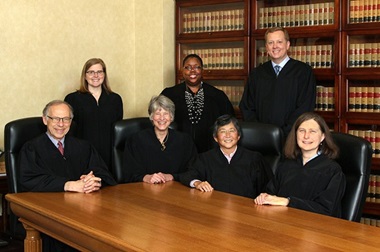The Court unanimously decided that the change in the law must be retroactive
The Oregon Supreme Court has done it again. They've made the effective repeal of the death penalty in Oregon retroactive. With the passage of
SB 1013 in 2019, "aggravated murder" was redefined -- making it harder to qualify for -- but not retroactively so.
The new law redefined crime of aggravated murder -- the only crime for which the death penalty is a possible sentence -- to include
- Premeditated, intentional homicide of two or more persons that is committed with the intent to either intimidate, injure, or coerce a civilian population, influence the policy of a government by intimidation or coercion, or affect the conduct of a government through destruction of property, murder, kidnapping or aircraft piracy -- terrorist acts.
- Murder by a defendant in custody, after the defendant was previously convicted in any jurisdiction of any homicide that would constitute the crime of aggravated murder or murder in the first degree.
- Premeditated intentional murder against a person under 14 years of age.
In an opinion authored by Oregon Supreme Court Justice Rebecca Duncan,
Oregon v. David Ray Bartol, the Court unanimously decided that the change in the law must be retroactive -- in short because the law changed the moral standard, it would be cruel and unusual under the US Constitution’s Eighth Amendment to apply the death penalty to a crime that
was a death penalty crime when committed, but no longer is.
 T
The death penalty has been on the books and off the books several times throughout Oregon's history, driven by the voters, the Legislature and the judiciary. Initially, the Oregon Constitution contained no provision for the death penalty. The death penalty for first degree murder was adopted by statute in 1864 -- just five years after statehood.
From 1864 to 1903, county sheriffs conducted executions. In order to restrict public attendance at executions, the Oregon Legislature amended the law to require executions be carried out at the Oregon State Penitentiary in Salem in 1903.
Between 1904 and 1914, 24 men were hanged at the penitentiary. On Dec. 13, 1912, four men were executed on the same day, the most at one time at the penitentiary. There have been seven executions of two people on the same day.
In 1914, Oregon voters, by constitutional amendment, repealed the death penalty with a razor-thin 50.04 percent of the vote adding Article I, 36 of the Oregon Constitution. In 1920, voters restored the death penalty by repealing Article I, 36 and approving Article I, 37-38, with 56 percent of the vote.
On Nov. 3, 1964, Oregon voters repealed the death penalty by 60 percent of the vote. On Nov. 5, 1964, Governor Mark O. Hatfield (R) commuted the death sentences of three people
The repeal remained in effect until 1978, when Oregon voters approved Ballot Measure 8, re-instituting capital punishment by lethal gas. Unlike prior death penalty laws, Measure 8 did not amend the Oregon Constitution, but rather was incorporated into the Oregon Revised Statutes, amending ORS 163.115 and creating ORS 163.116. Measure 8 won 64 percent of the vote.
Under the death penalty statute, the sentence was determined by the trial judge, without a jury. In 1981, the Oregon Supreme Court struck down the death penalty statute because it deprived the defendant of his right to trial by jury.
A D V E R T I S E M E N T

A D V E R T I S E M E N T
In 1984, Oregon voters approved Ballot Measure 6 which created Article I, 40 and exempted capital punishment from Article I, 15-16 of the Oregon Constitution. The measure passed with 55 percent of the vote.
Ballot Measure 7, in 1984, amended ORS 163.150 to require that, following a conviction for aggravated murder, a defendant be given a separate sentencing hearing before the trial jury. The measure passed with 75 percent of the vote.
In all, between 1904 and 1994, 115 people have been sentenced to death in Oregon, and 58 of those have been executed. The rest have had their sentences reduced, dismissed, commuted, or have died in prison. Of the 58, 55 were white and three black. Their ages ranged from age 17 to 67.
--Staff Reports| Post Date: 2021-10-13 10:29:40 | Last Update: 2021-11-12 17:29:37 |







 The death penalty has been on the books and off the books several times throughout Oregon's history, driven by the voters, the Legislature and the judiciary. Initially, the Oregon Constitution contained no provision for the death penalty. The death penalty for first degree murder was adopted by statute in 1864 -- just five years after statehood.
The death penalty has been on the books and off the books several times throughout Oregon's history, driven by the voters, the Legislature and the judiciary. Initially, the Oregon Constitution contained no provision for the death penalty. The death penalty for first degree murder was adopted by statute in 1864 -- just five years after statehood.
